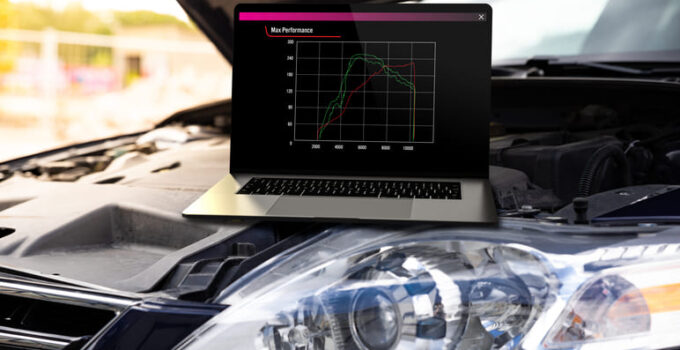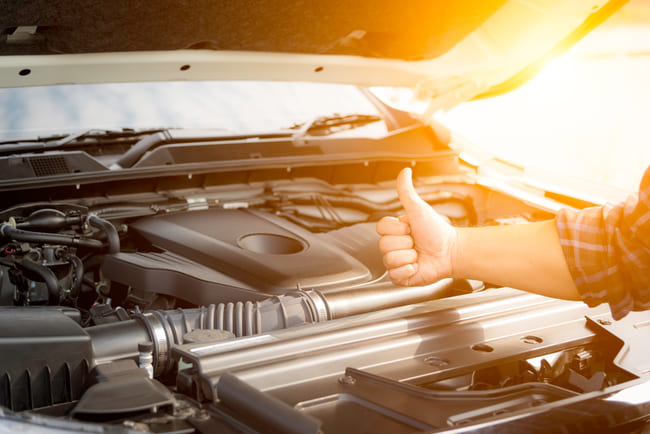
In general, chip tuning promises an increase in performance or a reduction in fuel consumption in modern vehicles. This technology is not suitable for very old vehicles because they do not yet have the appropriate control electronics. In practice, different variants are used, which are usually used to adjust the fuel injection quantity. For this purpose, sensor data is often manipulated or the software of your engine control unit is changed. In the following article we explain how chip tuning works, what the advantages and disadvantages are and whether you need to have the engine performance adjustment checked by the TÜV.
Contents
Chip tuning to increase performance

Drivers are most often looking for a chip tuning option if they want to increase their available engine power. As already described, certain measured values are often manipulated, such as the data exchanged between certain temperature sensors and the engine control unit. There are sometimes simply designed adapters that can be purchased on the Internet. However, you should never forget that the probability of success with such simple methods is rather low. On the other hand, these are associated with considerable risks, because your engine and all other vehicle components are exposed to considerable additional stress. As a result, increased wear and premature failure of some components can be expected. Under certain circumstances, it could even lead to irreparable engine damage.
Another commonly used method is the so-called „power pedal“. However, only the demand for engine power is changed by your accelerator pedal. In the end, the engine is pushed to the maximum even with a light tap on the gas pedal. Of course, this feels like it has more power, but in the end it just reacts a little faster and there is no real increase in engine performance.
Eco-Tuning: Engine tuning to reduce fuel consumption
In recent years, in addition to chip tuning to increase performance, engine optimization to reduce fuel consumption has also become the focus of many drivers. The aim is to be able to drive your vehicle well even with lower fuel consumption. Methodologically, similar systems are used as for engine performance enhancement. In this area, too, there are more and more providers vying for the favor of customers. However, since some of the interventions in your vehicle systems are very deep, you should take a closer look at what exactly is being offered to you and whether you can enjoy a corresponding guarantee.
How does chip tuning work?
This strategy for optimizing your engine includes all changes that change the engine management system in order to achieve an increase in engine performance or reduced fuel consumption.
The most flexible and promising way is certainly to optimize the engine control unit directly. For this purpose, the software in the delivery state is replaced by a new programming with a more efficient variant. As a buyer, however, you rarely know how good the new software actually is, as this depends on the skills of the software developer. We have already heard of cases in which the vehicle or its engine became almost unpredictable. Of course, you should never take such a security risk. Because the changes in most cases also change the pollutant emissions, you should insist on receiving a test report, which will serve as confirmation of the previous pollutant class.
The chip tuning and the main and emissions test

Every vehicle driving on public roads requires a corresponding permit. In the case of standard vehicles, a so-called type approval is usually used for this purpose. However, if you manipulate your engine with chip tuning, this type approval loses its validity for your vehicle. In such a case, a corresponding individual report from a recognized testing organization such as TÜV is required. This also gives you confirmation that the exhaust gas values still correspond to the standard that your car originally achieved. We recommend that you always commission chip tuning in direct connection with such individual reports. This reduces the risk for you as a driver if the diesel tuning does not conform to standards.
What can you achieve if you optimize your motor or your control unit
If you want to achieve the maximum possible increase in engine performance, you can calculate with a maximum of 50 additional horsepower, depending on the model. With this absolute exhaustion of what is technically possible, however, you are taking a particularly high risk. Ultimately, more fuel is injected into the combustion chambers, which of course means that more energy can be converted there. At the same time, however, the fuel is no longer completely burned, which leads to increased fuel consumption. In addition, the fuel that is not burned in the cylinder then burns in the exhaust system, where this can cause very serious damage. The exhaust system components overheat quickly. This increases their wear and can even cause your catalytic converter to burn out. Don't neglect the significantly higher pollutant emissions after optimizing your control unit. This means that you and your vehicle quickly fall out of the corresponding emission class. This can lead to significant additional costs.
Conclusion
As in many other areas, the motto also applies to chip tuning: Stay away from offers that sound too good to be true. So you can hardly expect that you can turn a lame duck into a powerful car with an adapter for just a few euros. You should also bear in mind that in most cases you will lose the manufacturer's warranty and also have to reckon with a higher probability of failure of the engine and other important vehicle assemblies. First of all, this applies regardless of the type of chip tuning you choose. If you are ultimately sure that you want to have this type of engine tuning carried out, we recommend that you stick to the large and long-established providers. Also insist on written guarantees and warranty claims.
A tip from CarTipsandmore: We are often asked which chip tuning is recommended. In general, we advise against systems that simply manipulate sensor data and thus the response of the engine control unit to it. This can ultimately not be good for your engine, even if you achieve some kind of engine tuning. If you absolutely want to have chip tuning carried out, it is often the best strategy to replace the engine control unit or install new engine control software.
